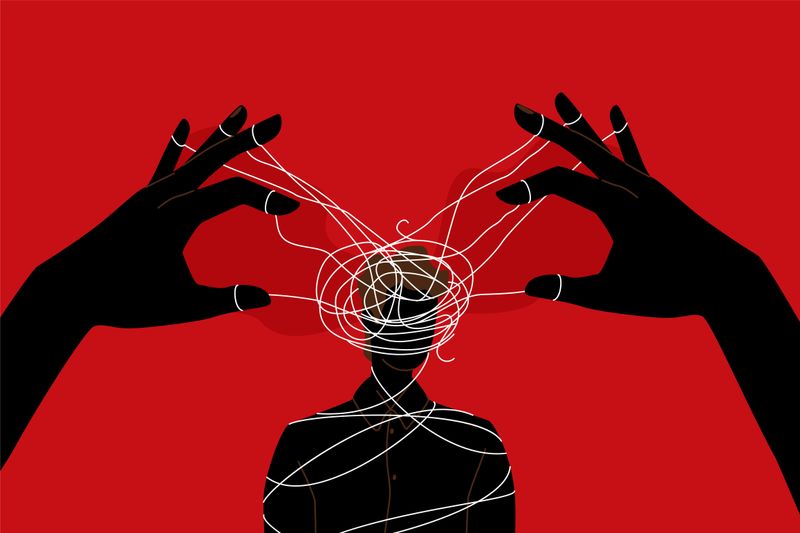You know that moment when you wake up, heart pounding, realizing you’ve been lying to yourself about a relationship for way too long? Yeah, I’ve been there.
If you’re reading this, maybe you have too, or you’re sick of watching someone you love shrink under the weight of habits that chip away at who they are. Let’s get honest—no sugarcoating. Here’s the raw truth about the toxic patterns we keep calling “normal.”
If any of these hit too close, know you’re not alone. We can’t heal what we won’t name. These are the seventeen habits I wish we’d all stop making excuses for—because you and your heart deserve better.
1. Gaslighting: The Mind Maze
Remember the first time you question your own memory in a fight? Gaslighting isn’t just a word people throw around online—it’s a slow, relentless unravelling of your trust in yourself. One day, you feel confident in what you see or sense. Next, you find yourself apologizing for being “too sensitive.”
You spend hours replaying conversations in your head, desperate to prove you’re not crazy. That’s what gaslighting does—it makes you second-guess every reaction. When someone constantly rewrites your reality, you start doubting your own sanity, piece by piece.
It’s more than lying or disagreement. It’s subtle, calculated, and soul-draining. You might start believing whatever’s easiest just to stop the arguments. The real heartbreak? You lose faith in your own voice.
If this sounds familiar, remember—your memories and feelings are not imaginary. You’re not losing your mind—the situation makes you feel that way. That’s what makes it toxic. Don’t underestimate how deeply it cuts. Trust your gut—always.
2. Constant Criticism: The Quiet Erosion
At first, it’s a snide comment about your clothes or your laugh. Then it’s how you load the dishwasher, your driving, even your dreams. Like erosion wearing down a stone cliff—you still look solid, but pieces of you keep falling away.
You live with someone who makes your confidence shrink until you barely recognize yourself. Every remark chips away at the parts of you you like best. Criticism doesn’t make you better—it makes you anxious, walking on eggshells in your own home.
Some people call it “tough love,” but it’s not. Real love supports growth—it doesn’t demand perfection. The line between helpful feedback and toxic nitpicking isn’t thin—it’s a mile wide.
You deserve someone who lifts you, not someone who makes you feel like you’re never enough. Don’t let anyone convince you that you’re just “too sensitive.”
3. Controlling Behavior: The Disappearing Act
Control sneaks in quietly. It starts as concern—”Text me when you get there,” or “I just want to keep you safe.” But soon, you realize you can’t breathe without asking permission.
You begin accounting for every minute when you’re out. If you don’t, there’s a fight, accusations, cold shoulders. It’s not protection; it’s possession. You start canceling plans, hiding details, inventing stories just to avoid drama.
Losing your independence isn’t romantic. It’s suffocating. If someone loves you, they respect your freedom, not shrink your world. Control doesn’t always look like handcuffs. Sometimes, it’s a subtle chain—and you don’t realize how tight it gets until you try to break free. Trust someone who trusts you back.
4. Silent Treatment: The Weaponized Pause
Remember those fights where the worst pain isn’t what’s said—but what’s not? The silent treatment isn’t cooling off—it’s punishment. It’s a battle fought with absence, leaving you stranded on an emotional island.
You spend whole weekends watching your phone, desperate for a reply, replaying every word you say. Silence becomes torture when you’re shut out for wanting to talk things through. It doesn’t build space to heal—it festers, grows resentment, and teaches you to swallow your feelings.
Healthy conflict can hurt, but it moves the story forward. This kind of silence is a roadblock. When someone uses it to control or punish, they hold the relationship hostage. Your voice matters, even in a fight. Don’t settle for love that feels like you’re shouting into a void.
5. Jealousy Disguised as Love: The Green Monster’s Mask
Ever had someone say, “I’m just jealous because I care”? Jealousy masquerades as passion—but let’s call it what it is: a fear factory. At first, it almost feels flattering. Someone wants you all to themselves. Then it turns to suspicion, monitoring, and unfair accusations.
You start deleting contacts, hiding texts, shrinking your world just to avoid their questions. That’s not flattering—it’s isolating. When someone uses love as a cover for control, they reduce your life to the size of their insecurity.
Real love celebrates your connections—it doesn’t police them. If jealousy rules your relationship, trust already left the building. Don’t let anyone guilt you into believing possessiveness is a compliment. You’re not property. You’re a whole person who deserves trust and freedom.
6. Emotional Manipulation: The Puppet Strings
Have you ever apologized for something you didn’t do, just because it was easier? Emotional manipulation is a masterclass in guilt trips. People who use it twist your feelings until you’re not sure what you believe anymore.
You say sorry just to keep the peace, even when you know you did nothing wrong. That’s how you start feeling responsible for someone else’s moods, anxieties, or anger. They play the victim, spin stories, and make you the bad guy.
This isn’t just drama—it’s exhausting. Manipulation looks like love, but it’s about control. You don’t have to carry the weight of someone else’s emotional chaos. Don’t let twisted logic convince you to abandon your own boundaries. Your feelings are valid—even when someone says they’re not.
7. Avoiding Difficult Conversations: The Slow Burn
Did you ever felt the air so thick with things unsaid you could barely breathe? Avoiding hard conversations is the slowest way to ruin a relationship. You convince yourself ignoring problems will make them disappear. It never works.
You tiptoe around issues, pretending everything’s fine. But resentment doesn’t vanish—it multiplies. One day, it spills out, and suddenly you’re fighting about something from six months ago.
Avoiding doesn’t protect anyone. It just delays the pain. The scariest talks often set you free. If you can’t say what you need, you’re not in a partnership—you’re playing house with a stranger. Don’t sacrifice your needs for temporary peace.
8. Holding Grudges: The Unseen Weight
Holding grudges in a relationship is like carrying a suitcase full of bricks. You try moving forward while dragging emotional baggage you can’t put down. Maybe you smile on the outside, but that weight never leaves you.
Every new argument reopens the old ones, until you’re fighting about everything and nothing all at once. Those old wounds never heal—they just get moldy.
Forgiveness doesn’t mean forgetting. It means not letting the past ruin the present. If you can’t put the suitcase down, you’ll both trip over it. Let go of what poisons your peace—or it’ll steal your joy one memory at a time.
9. Neglecting Personal Boundaries: The Invisible Fence
You feel like you can’t breathe because someone is always in your space. It’s not just rude—it’s relationship sabotage. It starts with reading your texts or dismissing your need for alone time. Soon, nothing feels like yours.
He shows up everywhere—your work, your gym, your therapy sessions. It looks like devotion, but it’s a refusal to respect your autonomy. Boundaries aren’t walls to keep people out. They’re fences that keep love healthy.
You’re allowed to have a life outside your relationship. Your privacy, your time, and your body are not up for negotiation. If someone keeps crossing the line, they’re not loving you—they’re consuming you. Protect your space like your happiness depends on it—because it does.
10. Overusing Technology: The Digital Divide
Did you ever sit next to someone you love and feel lonelier than when you’re alone? Overusing technology creates a canyon, not a bridge. When every dinner is interrupted by notifications and every conversation competes with a screen, connection slips through your fingers.
You start to feel invisible, like a background actor in your own relationship. It’s not about the phone; it’s about the message: “Something else is more interesting than you.”
Technology isn’t the enemy, but it can become a wall if you let it. Love needs presence, not just proximity. Watch for when your partner’s face glows blue more than it lights up at the sight of you. Reclaim your time together before the silence gets louder than the scrolling.
11. Scorekeeping: The Relationship Ledger
Ever feel like you’re playing a never-ending game of Who Owes Who? Scorekeeping ends intimacy faster than any fight. Every favor, every mistake, every chore—tallied, remembered, and brought back as ammo.
You find yourself replaying every slight, every imbalance, every “I did this, so you should…” But love shouldn’t feel like a spreadsheet. If you’re keeping score, you’re not loving—you’re managing a competition.
Gratitude gets lost when you’re counting favors. Love thrives on generosity, not debt. Nobody wins the blame game. Eventually, both people just want out. Drop the ledger. Love feels lighter when you stop keeping track.
12. Walking on Eggshells: The Fearful Pause
If you’ve ever edited your words so carefully you barely recognize your own voice, you know what walking on eggshells feels like. It’s exhausting, pretending to be smaller so someone else doesn’t explode. You lose yourself, bit by bit, to their moods.
You learn to read signs—tone, body language, silence. You become a storm-forecaster instead of a partner. That’s not love—it’s survival.
You deserve a space where laughter comes easier than apologies. If you’re always bracing for impact, that’s not a relationship—that’s captivity. Your peace should matter as much as theirs. Don’t shrink to fit someone else’s comfort zone.
13. Financial Manipulation: The Money Trap
Money can be love’s cruelest weapon. Financial manipulation isn’t always obvious. It’s not just hiding paychecks—it’s demanding receipts, controlling what you spend, or making you beg for basics.
You can’t buy lunch or pay a bill without defending yourself. It doesn’t feel like partnership—it feels like prison.
Independence is as much about dollars as it is about dreams. If you have to justify every expense, ask yourself: is this love or ownership? No one should have to trade dignity for dinner. Protect your right to financial freedom; your bank balance shouldn’t be the leash that keeps you close.
14. Public Humiliation: The Open Wound
Have you ever wanted the floor to swallow you whole? Public humiliation cuts deeper than any private argument. When a partner mocks, criticizes, or belittles you in front of others, the shame lingers long after the moment passes.
You sit in a room full of people and suddenly feel exposed, small, and humiliated—because someone you love uses you as a punchline. You smile through it, laugh along, or pretend you’re fine. But the bruise isn’t just emotional—it’s relational. Love is supposed to be your safe space, not a stage for ridicule.
Don’t let anyone convince you that it’s harmless fun. It’s not banter if it hurts. Dignity matters, and love never puts you on display for applause. If you feel unsafe or unseen in public because of your partner, that’s a red flag waving in plain sight. Stand up for yourself, even if your voice shakes.
15. Love Bombing: The Overdose
Ever felt smothered by someone who seemed too good to be true? Love bombing is the rush of attention that sweeps you off your feet—then knocks you off balance. It starts with big gestures, endless compliments, and promises of forever made before dessert arrives.
Love bombing isn’t about genuine affection; it’s about setting the hook. Once you’re attached, control creeps in, and the real person shows up.
If someone moves too fast, showers you with affection, then shifts to criticism or control, that’s not romance—it’s a trap. Healthy love grows slow. Watch for intensity that feels like a tidal wave. You deserve steady, not dizzying.
16. Refusing Accountability: The Blame Game
Have you ever felt like every fight ends with you as the villain, no matter what happened? Refusing accountability is the coward’s escape route. When someone always deflects, denies, or blames you, a fair fight turns into a losing battle.
When your partner can’t admit mistakes, you feel invisible. Owning up isn’t weakness—it’s maturity. Refusal to do so teaches you to distrust your instincts.
A healthy relationship is a team effort, not a blame contest. If apologies are one-sided, look for the exit sign. Growth happens when both people can say, “I messed up.” Don’t let pride or fear become the third wheel in your love life.
17. Withholding Affection: The Cold Front
There’s a chill that settles in when love turns into a bargaining chip. Withholding affection is a silent punishment—one that leaves you craving a smile, a touch, or even eye contact. Suddenly, the bed feels colder, the silence heavier.
You go days without a hug, a kind word, even eye contact. Affection becomes a reward, doled out only when you behave. That kind of love is conditional, and it leaves scars. You shouldn’t have to earn warmth or connection.
Healthy love is given freely, not held hostage. If affection disappears every time there’s conflict, you’re not just being punished—you’re being trained. Don’t accept crumbs when you deserve the whole cake. Your heart needs nourishment, not starvation.


















